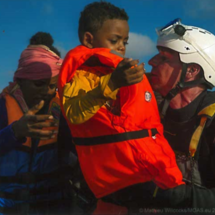
Pauline Diamond Salim meets Jim Snedden, veteran firefighter and Scottish Refugee Council ambassador.
Our ambassador Jim Snedden has spent twenty years working for the Scottish Fire & Rescue Service. He now runs the fire station at Dunblane and trains other firefighters as a swift water rescue instructor.
Over the summer of 2015, Jim, like many people, was shocked by the images of people drowning in the Mediterranean Sea . Over his twenty year career with the Scottish Fire Service, particularly in his role as a swift water rescuer, he knew about the dangers at sea.
The charity MOAS was coordinating rescue missions in the Mediterranean with international crews when they reached out to Jim and asked if he’d be interested in supporting their rescues.
“The first time I went out was a massive shock to the system. I flew to Malta and within four hours of landing I was on a ship heading towards Libya searching for people in distress. The first boat we rescued was a rubber dinghy about twelve miles off the coast of Libya. I couldn’t believe how many people were crammed onto it. More than 120 people.
“My role was to calm everyone down. There’s a lot of panic you know? The boat is sinking. People are terrified. Any sudden movements and it could go down. When people pay for these journeys they are promised it will be in a suitable, sea worthy boat. But they are put onto the boats at gunpoint on the beaches of Libya. I’ve seen boats with punctures in them. People would rather die at sea than die in Libya, that’s how desperate it is.
“Another mission I took part in started at 4am and lasted well into the next night. We rescued about 2000 people that day. 480 people were all crammed into the one boat.”
Jim shows me a stack of photographs from his first rescue mission with MOAS. The colours are very bright; neon orange life vests, a cloudless blue sky. He shows me familiarly shocking images of rubber dinghies packed with 120 people, legs hanging over the sides. But these pictures are shot in close-up and I can see the fear and panic in people’s eyes. The sun beats down on the little boat and it’s clear everyone is baking in the heat and fear. “It looks like a boat full of men,” says Jim. “Most of the pictures of these boats look like that. But what you don’t see is the children and women in the inside of the boat. They go in the centre and the men go around the outsides.”
We look through more pictures this time of Jim lifting young children and babies from the boats to safety. “This is my favourite picture,” he shows me a shot of a young girl clutching on to him. “She wouldn’t let go of me. People are desperate for you to do something, they grab you and cling to you, you are their last hope.”
Nothing in Jim’s life or career had prepared him for this. The scale, the amount of people, the desperation, how it could all have been avoided, the fear, the image of someone of a beach with a gun forcing people onto a leaking boat. The idea that people are making money out of this.
What impact has this had on him?
“It’s changed my outlook. Now I know a bad day for me here is a good day really in the bigger scheme of things. I know my wife, my three kids are all safe and ok.
“I’ve also learned about why people seek refugee protection, how the people I spoke to didn’t want to leave home but were absolutely forced into it.
“I’ve joined Scottish Refugee Council because Iwant to find out about the next stage in people lives and help how I can. I’ve realised that the journeys at sea are just one stage of people’s journeys. I thought naively that getting people to dry land safely was the end of the story, that things would work out OK for the people I rescued. Now I know that’s just one part of the story and a whole other journey begins for folk once they are here in a foreign country with all the trauma of what they experienced en route and that they fled in the first place.
“There is a lot of good work going on in Scotland in terms of welcoming people but we need to do everything we can to help people integrate and really feel like they belong here and help them reach full potential here. Everyone deserves safety and everyone deserves a chance.”
